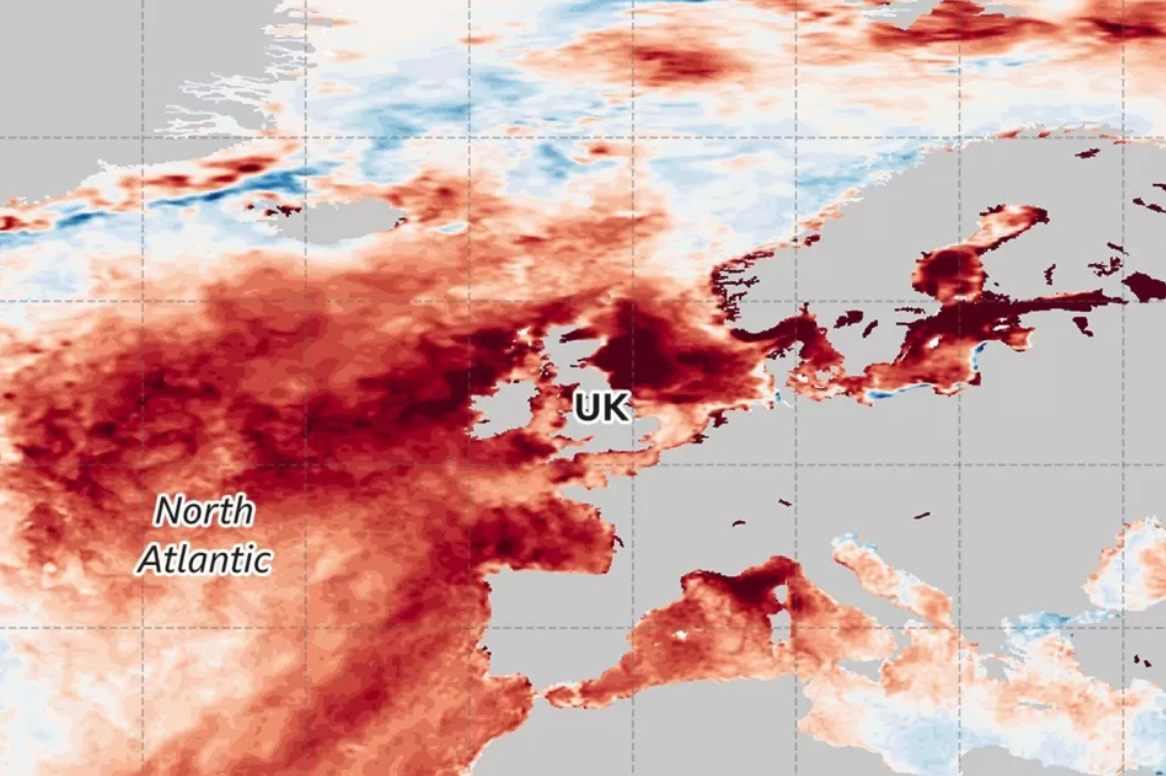
Warming at twice the global rate, Europe experiences extreme sea temperatures and drought
The data does not lie. Climate scientists are deeply concerned about rocketing sea and air temperatures, occurring even before a predicted El Nino event in the Pacific, which normally fuels temperatures even further.

C: UK Met Office and European Space Agency
The data does not lie. Climate scientists are deeply concerned about rocketing sea and air temperatures, occurring even before a predicted El Nino event in the Pacific, which normally fuels temperatures even further.
According to a report from the World Meteorological Organization and the Copernicus Climate Change Service, what may surprise many people is that Europe is now warming faster than any other inhabited region.
Record rising temperatures are fuelling increasingly severe heat waves, floods, and wildfires.
The report shows Europe has been warming twice as much as the global average since the 1980s, with far-reaching impacts on the region’s socio-economic fabric and ecosystems. Last year, Europe was approximately 2.3 °C above the pre-industrial average. “In 2022, many countries in western and southwestern Europe had their warmest year on record,” said WMO Secretary-General Petteri Taalas. “Summer was the hottest ever recorded.”
The heat has consequences. Europe saw a staggering 16,000 heat-related deaths last year, with weather-related economic damages totalling $2 billion.
Spain is already gripped by a major drought, even though they are still in early Summer. The whole of the Western Mediterranean has also experienced record-low rainfall.
Spain is in severe drought made more likely by climate change. UK relies on Spain for about 1/4 of its fresh produce.
We need to boost food security by moving to a more plant-based diet, & so feeding far more people per hectare.https://t.co/kP8z3ps7Khhttps://t.co/i5dSQY5Lr5 pic.twitter.com/Kr9pZJ6dwL— Simon Oldridge (@SiOldridge) June 19, 2023
Now let’s look at the ocean. As we continue to belch out vast amounts of carbon dioxide, the oceans have been experiencing significant warming for decades. According to scientists, the ocean contains 90 per cent of the heat from human-induced global warming. But once again, it is Europe where extreme temperatures are being recorded.
According to the UK Met Office, global sea surface temperatures in April and May reached an all-time high. Professor Stephen Belcher, the Met Office’s Chief Scientist, said: “May 2023 has seen the highest temperatures of any May since 1850. But it doesn’t stop here. It has also been the highest month above average compared with any individual month in the series.”
This month temperatures are also likely to break records too. The US National Oceanic and Atmospheric Administration has currently categorised some parts of the North Sea as a category four marine heatwave, considered “extreme” by scientists. Some areas off the coast of England are currently up to 5C (9 degrees Fahrenheit) above normal levels.
The whole marine region is experiencing heat stress. For the last three months, sea surface temperatures in the North Atlantic have been higher than any on record during this time of the year. “It’s clearly out of the envelope,” François Lapointe at the University of Massachusetts Amherst told the New Scientist magazine. “That’s very worrying.”
SUDDEN LARGE INCREASE NORTH ATLANTIC HEATING
Increased since March -more May Europe is already heating at 2X the global average so this will boost it some more. Increase warm water entering Arctic- sea ice decline. https://t.co/iSMJP7qQXN#ocean #climatechange #globalwarming pic.twitter.com/WTbiGGgh80— Peter D Carter (@PCarterClimate) June 21, 2023
This is absolutely bananas.
There is NOTHING like this on the instrumental record. Its likely impact is probably immeasurable.
But is it leading our news bulletins & on newspaper front pages?
Nope. pic.twitter.com/nxUVXAxLiB
— John Gibbons 🇵🇸 (@think_or_swim) June 21, 2023
The record temperatures are currently having a devastating impact off the coasts of Ireland and the UK, with the heatwave posing a serious threat to marine life.
Daniela Schmidt, a Professor of Earth Sciences at the University of Bristol, told the Guardian “Heat, like on land, stresses marine organisms. In other parts of the world, we have seen several mass mortalities of marine plants and animals caused by ocean heatwave which have caused hundreds of millions of pounds of losses, in fisheries income, carbon storage, cultural values and habitat loss.”
Schmidt warned that “as long as we are not dramatically cutting emissions, these heatwaves will continue to destroy our ecosystems”. Other scientists told the paper the temperature rises were “unprecedented and possibly devastating”, warning of mass mortality for species such as kelp, seagrass, fish and oysters.
Leading scientists are deeply concerned about what they are witnessing concerning sea temperatures and drought. The climate impacts are coming faster and harder than many feared. For years many countries in Europe thought they would not be on the frontline of our climate crisis. But they are. And this should force them to move faster and harder to tackle climate change and disinvest out of oil and gas as fast as possible. Because the data does not lie.
